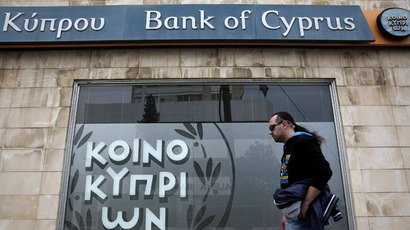Slovenia to adopt austerity plan in bid to avoid bailout
Slovenia, one of the EU's most recent members, is struggling to avoid becoming the fifth eurozone country after Cyprus to ask for financial aid. The challenge for the Alpine country, once a model of socialism, is to prevent an international bailout.
Earlier this week, Slovenia's government revealed an austerity
plan to raise €540 million in new taxes to balance the budget and
avoid an international bailout.
“Everybody who has been in trouble in the eurozone in the last
years in the first phase of the crisis always refused to admit that
they are really in trouble. And that of course is first of all some
kind of psychological game they are trying to play with the markets
and with the public at large,” Johan van Overtveldt, editor in
chief of financial magazine Trends told RT.
“All the countries that came into the danger zone eventually had
to ask for help which is something national governments don’t like,
because then obviously to a certain degree at least they have to
answer to and to obey to foreign powers, be it the European Central
Bank or the European Commission, the IMF or the three together in
the famous Troika,” he said.
The government is planning to partially privatize 15 state-run
companies, including Slovenia’s second-largest bank Nova Kreditna
Banka Maribor, Ljubljana airport, Adria Airways airline and Telekom
Slovenija communications operator.
The austerity plan must be approved by Slovenia's parliament and
will be then handed to the European Commission, which is expected
to discuss it later this month.
Slovenia, a nation of 2 million, is one of the 17 nations that uses
the Euro currency. Government debt has seen eurozone nations
Greece, Ireland, Portugal, Spain and Cyprus receive emergency
loans, which Slovenia is attempting to avoid.

In late April, up to 2,500 protesters gathered in the Slovenian
capital to protest against tax increases and public sector wage
cuts. While unemployment in the country recently reached a 14-year
high, many are still hoping that a bailout can be avoided
Five state-controlled banks – with an estimated €7 billion in bad
loans on their books – are at the epicenter of Slovenia's economic
crisis. The government is scrambling to find a way to support the
banks and avoid a collapse of the country's entire banking
system.
According to a document released on Friday, Slovenia plans to
transfer €3.3 billion in bad loans, held by its three largest
state-controlled banks, to a newly established 'bad bank,' due to
open in June. In return, the three banks combined will be given
state-guaranteed bonds worth €1.1 billion
The country's sales tax will increase from 20 percent to 22
percent, and the government is set to introduce further taxes next
year.
"We are aware that tax increases won't have a positively impact
on the economy and the recovery, but we have opted for the least
harmful option," Prime Minister Alenka Bratusek was quoted as
saying. "I believe this will satisfy the European
Commission."
Slovenian Economy Minister Stanko Stepisnik explained that the
government is planning to propose a temporary crisis tax on all
incomes, which could be introduced at the end of the year. The
government has been negotiating a public-sector wage freeze.
Slovenia has been in recession since 2011, with an unemployment
rate of 13.5 percent. Slovenia's economic output is forecast to
shrink 2 percent this year and 0.1 percent in 2014, according to
the European Commission.
Last week, ratings agency Moody's cut Slovenia's rating by two
notches to 'junk.' However, the Slovenian government managed to
raise €3.5 billion from international bond markets in early
May.
On Friday, the European Bank for Reconstruction and Development
(EBRD) said that Slovenia's recession was likely to continue into
2014, with output set to shrink 0.9 percent next year following a
forecasted 2.5 percent contraction in 2013.













